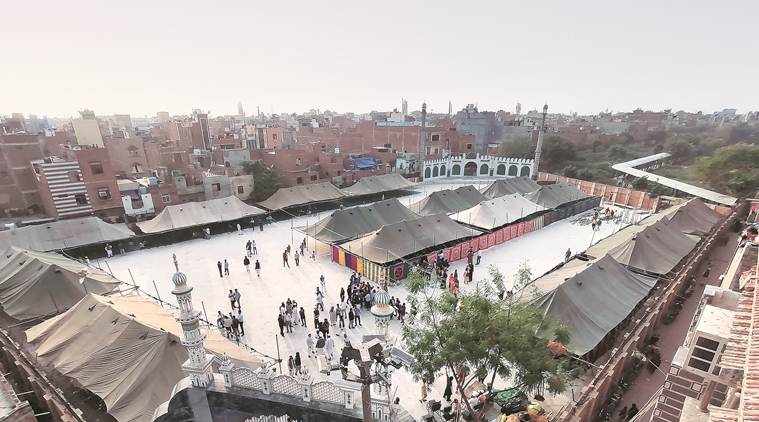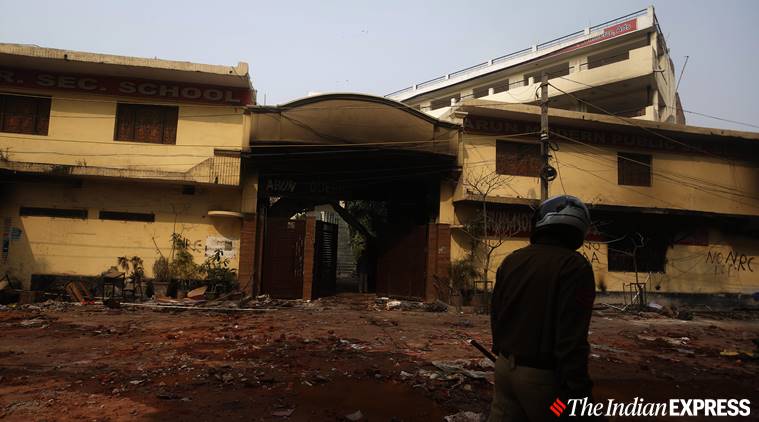 The Eidgah relief camp in Mustafabad. (Express Photo by Amit Mehra)
The Eidgah relief camp in Mustafabad. (Express Photo by Amit Mehra)
It was on February 28 that Chief Minister Arvind Kejriwal announced that eight night shelters and an East Delhi Municipal Corporation-run community centre, where at least 42 displaced families from Garhi Mendu village had already moved, have been notified as relief camps for those whose lives were upended by the riots in Northeast Delhi.
But there was a problem: There were no takers for the night shelters, with the perception around them being hubs of drug addicts and petty thieves, keeping working-class displaced families away. Many families chose to stay with their relatives or even neighbours, while some left for their villages.
 “Deeply dismayed that Delhi government (is) refusing to set up large relief camps. Homeless shelters are no substitute; they offer neither the safety nor dignity which people battered and terrorised by communal hate require from a caring state. Citizens’ initiatives are trying to fill the gap,” bureaucrat-turned-social activist Harsh Mander, whose organisation has also been leading relief efforts, tweeted on February 29.
“Deeply dismayed that Delhi government (is) refusing to set up large relief camps. Homeless shelters are no substitute; they offer neither the safety nor dignity which people battered and terrorised by communal hate require from a caring state. Citizens’ initiatives are trying to fill the gap,” bureaucrat-turned-social activist Harsh Mander, whose organisation has also been leading relief efforts, tweeted on February 29.
On March 2, the Delhi government took corrective measures, notifying a large facility as a relief camp, opened by the Delhi Waqf Board and with a capacity to house over 1,000 people, in a Muslim prayer ground in Mustafabad. Within a day, over 1,000 families had moved in, indicating the extent of displacement and loss.
Government functionary Abhinandita Mathur, who is coordinating relief efforts in the district, told The Indian Express that authorities are still working out the specific numbers of men, women and children who have taken shelter at the Eidgah camp in Mustafabad, but they estimate that around 800-1,000 people continue to live here.
“Apart from those who stay, around 500 people more, living with their relatives or elsewhere, are also having food here. They are given tea and rusk in the morning, while children are given milk. During lunch and dinner usually roti, sabzi and biryani are provided. Donations are coming from the Waqf board as well as NGOs and individuals,” said Mathur.
Every family seeking shelter is being given a kit comprising a toothbrush, toothpaste, hair oil, soap, shampoo, sanitary pad, shaving kit, clothes including undergarments, footwear, towel, a blanket, and a few other items.
Around 800 folding beds were brought with the help of an NGO after it started raining on the night of March 5, flooding the ground and the nearby area, where sewer lines have not been laid yet.
There are eight toilets in the camp for women and six for men, said Mathur. Three medical camps are being run by Al-Hind Hospital, Holy Family Hospital and GTB Hospital respectively, with doctors catering to a range of ailments from tuberculosis to fungal infections.
Mental health experts, including from IHBAS, are also working at the camp, tending to the needs of those suffering from post-traumatic stress disorder. A reading camp has been put up by the Delhi Commission for Protection of Child Rights, with its member Ranjana Prasad overseeing the activities.
Legal help desks have been set up by NGOs such as the Muslim Council of India to help people fill damage claim forms distributed by the Delhi government. While people are being urged to return to their homes — an appeal made by Kejriwal on February 29 itself — the camp will not be disbanded anytime soon, especially with Holi around the corner, said officials.
 A school in Mustafabad. (Express photo/Amit Mehra)
A school in Mustafabad. (Express photo/Amit Mehra)
“The situation is still delicate. We are requesting people to at least spend some time in their neighbourhoods during the day. Rehabilitation is a long process. In some cases, people have nowhere to go with their houses completely ravaged. For them, the full compensation amount is paramount. In that respect, we are carrying out a verification drive so as to expedite the release of money. After Holi, we might decentralise the camp and split it into smaller units,” said an official.
For now, authorities are also busy cleaning up affected neighbourhoods, which were strewn with reminders of the riots in the form of charred vehicles, shards of glasses, stones, torn down walls.
While police were “initially reluctant” to give permission to such a sprawling facility in the middle of the neighbourhood, it has now deployed personnel and PCR vans to patrol the area at regular intervals, said an official.